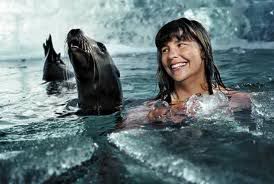 |
| Lynne Cox, author of Swimming to Antarctica and South With The Sun |
Colin talks to author Lynne Cox about the relationship between writing, endurance, and highway transportation systems
CGB: In reference to swimming across the English Channel, you mentioned never wanting to do the same thing over and over again. How do you feel about stop-and-go traffic?
LC: That's why I live in California, so I can drive on the freeways.
It took you 7 years to write South With the Sun, and 21 to write Swimming to Antarctica, which you began writing on a typewriter and finished on computer. Do you prefer one over the other?
Each book has its own method. The way I wrote Swimming to Antarctica was chronological, but then Grayson was just sitting down to write this "One day..." story, and then [South With The Sun] was me weaving stories through time and place and theme, which was so different than what I'd done before. So, your question was... what?
Well, your answer is more interesting than my question. But some writers have strong opinions about, for example, writing on a laptop as opposed to a pad of paper.
What I learned is that I'll start by writing longhand. When I know that I'm ready to do it, I'll start writing, and the first two or three or four paragraphs will be constant writing, and then I'll sit down and start writing it on the computer, because I don't think writing longhand anymore is good for me. Now, I can just go from brain to computer.
You spoke of invoking a "presence of mind," while swimming alone in the dark at 1 in the morning or above a baby whale. Does that presence of mind necessary for enduring such mentally and physically demanding states and situations serve a purpose in the process of writing a book?
Absolutely. That's such a great parallel, because you have to maintain the storyline, you have to keep going in a forward direction, because if you don't, you lose yourself and you lose the story. And there's nothing worse than to be in the middle of... "I finally figured out what I need to write here," and then somebody calls you. Because you know that that whole thing you've figured out in your brain now that you're just about ready to write... you're thinking as you're going along, and now that thought is gone, and it just drives me nuts.
So you value preparation and endurance when it comes to thinking?
Exactly, and seeing a thought all the way through. That's why I don't write poetry. I'm a long writer. I write books. But that whole sense of being right there in the moment as you're writing it, that's what I really try to do. That's why I love when people say, "When I read about your swim in Greenland, I felt like I was right there." That's the best that I could ever hope to write: that I could take somebody and make them feel like they're right there in that moment.
It sounds like you're saying there's an association between length and longevity and the ability to focus.
Yes. And I learned, like swimming short distances in very, very cold water, the intensity of that focus is probably what got me through it. And the long distance swimmer is like the long distance novel or nonfiction writer. It's a book, not a novella.
You seem to like the cold. Have you considered writing a book about or in Minnesota. Perhaps one titled, Living in Saint Paul?
I hadn't thought about that. But I keep hoping that one day I'll get to swim across Lake Wobegon.

No comments:
Post a Comment